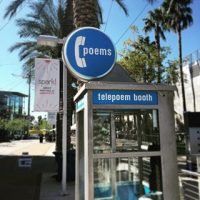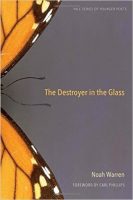March 31, 2016
Edited by David Sanders
Specimen Days
1621 – Andrew Marvell, England, poet (To His Coy Mistress), is born.
1631 – John Donne, Metaphysical poet, dies (birth date unknown)
1838 – Leon Dierx, French poet, is born.
1891 – Ion Pillat, Romaniams poet/senator (Umbra timpului), is born.
1933 – Nichita Stănescu, Romanian poet (d. 1983), is born.
1938 – Willem J T Kloos, Dutch poet/critic (New Guide), dies at 78.
1961 – Seerp Anema, Dutch poet/writer (Modern Art & Degenerating), dies at 85.
1980 – Vladimír Holan, Czech poet (b. 1905), dies.
1996 – Dario Bellezza, poet, dies at 51.

What wondrous life is this I lead!
Ripe apples drop about my head;
The luscious clusters of the vine
Upon my mouth do crush their wine;
The nectarine and curious peach
Into my hands themselves do reach;
Stumbling on melons as I pass,
Insnared with flowers, I fall on grass.
—from “The Garden” by Andrew Marvell (1621–1678)
“What wondrous life is this I lead! / Ripe apples drop about my head” —from “The Garden” by Andrew Marvell (1621–1678)
World Poetry
Lawyer: Poet Pardoned by Emir Leaving Qatar

A Qatari poet who was jailed for nearly five years will leave the country now that he has been pardoned by the Emir, his lawyer said. Speaking to Doha News, former justice minister Najeeb Al Nauimi said he had a conversation with Mohammed Rashid Al-Ajami this week, who confirmed he has been given an unconditional pardon. “It’s finished, it’s over,” Al Nauimi said.
A Qatari poet who was jailed for nearly five years will leave the country now that he has been pardoned.
Recent Reviews
Joseph Brodsky, Darker and Brighter
A spellbinding new biography rescues the poet from sentimentality and kitsch.
by Cynthia Haven
In June 1972, a young poet from Leningrad stepped off a plane in Detroit and into a new life. His expulsion from the Soviet Union had won him international fame; yet he didn’t know how to drive, how to open a bank account or write a check, or how to use a toaster. His English, largely self-taught, was almost incomprehensible. He had dropped out of school at 15. Nevertheless, at age 32, he would soon start his first real job, and at a world-class institution: He was the new poet in residence at the University of Michigan in Ann Arbor. Within a few years, Joseph Brodsky would be a colossus on the New York literary scene. Within 15, he would be awarded a Nobel Prize.
Dana Gioia’s Poetry
Review: 99 Poems: New and Selected, by Dana Gioia
by Micah Mattix
He hasn’t won a Pulitzer—yet—but make no mistake about it: Dana Gioia is one of the best American poets writing today, and his latest volume proves it. Organized topically (“Mystery,” “Place,” “Love,” to name three of seven) rather than by previously published collections, 99 Poems: New and Selected is a book for readers, not scholars. Fifteen of the poems are new. The rest have been selected from his previous four collections. All of them show a master at work.
New Selected Poems by Derek Mahon
Page-by-page highlights reel of the work of one of the finest poets of the last half-century
by John McAuliffe

How many books of “selected” and “collected” poems should one poet have? If it is Derek Mahon, one of the finest poets at work in the past half-century, the answer is five. The author, so far, of two Selected Poems and two Collected Poems, has now released New Selected Poems (Gallery Press/Faber and Faber, €13.90). For his existing readers, it is a page-by-page highlights reel. It will remind them where they were when they first read the astonishing gear changes of A Disused Shed in County Wexford (“Lost people of Treblinka and Pompeii!”) or the sudden self-portrait of Courtyards in Delft (“I must be lying low in a room there,/ a strange child with a taste for verse, / while my hard-nosed companions dream of war/ on parched veldt and fields of rainswept gorse.”).
Derek Mahon has released his second “Selected Poems” with his newest book, “New Selected Poems.”
Broadsides
The New Greek Poetry
by Karen Van Dyck
When there is less to go around, people fight, grab, get tough. Lately, Greece and the Balkans have been living with more than their share of less. Hunger, unemployment, slashed pensions and ruined businesses are rife in Athens. Electricity and water shortages reach levels associated with countries at war. More than 27% of Greeks are unemployed. Fifty-five per cent of young people, particularly those in the areas of technology and education, have left Greece to find work elsewhere. Forty per cent of children were living in poverty in 2014, and the number is now approaching 50%. Public debt is the highest in Europe, over 180% of GDP, while austerity measures make staying in the eurozone as difficult as a Grexit. The need for fast answers pushes voters to political extremes. Broken promises and corruption on all sides breed unfounded accusations and fatalism. Hardly anyone keeps money in the bank any more. News of murders and robberies shares equal airtime with ads for hi-tech security systems. Meanwhile, refugees fleeing Syria, Afghanistan, and Iraq arrive on islands such as Lesbos in their hundreds, and at times in their thousands, not wanting to be in Greece, but unable to get to countries with better social services. And where the refugee boats go, local fishermen follow, lining up on shore to jockey for their engines, hoping to resell them at a profit. More people, less to go around.
Walt Whitman Built Free Verse And Freedom Into His Poetry
by Daniel Allott
Walt Whitman is often celebrated as America’s finest poet. But it was a different story when he was alive. Whitman (1819-92) was ridiculed and ostracized during his lifetime. His seminal work — “Leaves of Grass,” a collection of free-verse poems — was called by many obscene for its overt sexuality. Even Whitman’s family was unimpressed with his work. When he brought the first copy home, his brother George dismissed it: “I saw the book — didn’t read it at all — didn’t think it worth reading — fingered it a little.”
Thirteen Poetry Collections to Read for National Poetry Month
by E. Ce Miller
This April marks two decades since the Academy of American Poets, and readers and writers of poetry everywhere, celebrated the first ever National Poetry Month. And what better way to honor the celebration than by adding some recent titles to the always-too-sparse poetry section of your bookshelves? Because let’s face it, as much as I’ve grown to love the traditional poets that filled the dog-eared anthologies of my school days (and I really do mean grown to love,) contemporary poetry — with its edgier formats, sharper images, modern themes, and freer verses — is definitely more my jam.
Thirteen Poetry Collections to Read for National Poetry Month
Drafts & Fragments
The Medium is the Message – the Power of Public Poetry
by Marta Bausells

He has been called a vandal, a street artist, a post-Situationist, a punk artist and the text-art Banksy. Scottish poet Robert Montgomery has consciously made an “awkward space” for himself in between artistic categories – and he thoroughly enjoys it. His work puts poetry in front of people in eye-catching visual formats: from advertising billboards he has covered with poems, to words he has set on fire or lit with recycled sunlight in public spaces – including the Sussex seafront and a Berlin airport. Recently, he has been working on today’s World Poetry Day “Pay with a poem” campaign, through which customers can get coffee in exchange for poetry in cafes across the globe. Montgomery will then collect the public’s poems to create an installation in a secret location.
Wait for the Poem: The Telepoem Booth Makes its Local Debut
by Diandra Markgraf

Telepoem Booth creator and Telepoet, Elizabeth Hellstern, has a call for you. With the heavy receiver unhooked, the dial tone’s steady hum chants a tune to another world only 10 simple clicks away. On the other end of the line, like a friend offers consolation, insight into a glaring truth, or a fist in the air of the world’s gloom, poetry is a pal willing to accept the charges of this collect call—and it’s for you.
The Telepoem Booth offers people in Flagstaff, AZ an opportunity to listen to poetry in an old fashioned phone booth.
Poetry In the News
Mai Der Vang Wins 2016 Walt Whitman Poetry Award

Fresno got yet another boost to its burgeoning reputation as a fertile ground for poetry Wednesday when Mai Der Vang, who teaches English at Clovis Community College, won the prestigious national 2016 Walt Whitman Award.The award is given by the Academy of American Poets to someone who has never had a book of poetry published. Along with a $5,000 cash prize and a six-week residency in Umbria, Italy, Vang’s submitted manuscript – titled “Afterland” – will be published in April 2017 by Graywolf Press.
My Cousin, the Cowboy Poet

Without a P.A. system, it was difficult to hear anything while sitting behind the podium, and so, as the cowboy poet R. P. Smith waited for his turn at the mike, arms akimbo and boots on the ground, he thought about the keynote address he’d endured the previous morning. The environmental historian Dan Flores had spoken about the market forces that drove white settlers to obliterate the bison and other big grazers in the Great Plains, the opulent safaris that reduced thundering herds to sun-bleached bones, and about the importance of rekindling that “American Serengeti” of old. Smith would have liked to argue a few points with the man, but he knew that the lexicon of the ranch didn’t always fare well against footnotes and Ph.D.s. He couldn’t quite articulate it, even to himself, but he believed there was something to be said for the industry that supplanted the herds of buffalo and pronghorn, something to be said for the here and now.
Mai Der Vang has been named winner of the 2016 Walt Whitman Award.
New Books
Forbidden City by Gail Mazur
[Paperback] University of Chicago Press, 72 pp., $18.00

Gail Mazur’s poems in Forbidden City build an engaging meditative structure upon the elements of mortality and art, eloquently contemplating the relationship of art and life—and the dynamic possibilities of each in combination. At the collection’s heart is the poet’s long marriage to the artist Michael Mazur (1935–2009). A fascinating range of tone infuses the book—grieving, but clear-eyed rather than lugubrious, sometimes whimsical, even comical, and often exuberant. The note of pleasure, as in an old tradition enriched by transience, runs through the work, even in the final poem, “Grief,” where “our ravenous hold on the world” is a powerful central element.
New and Collected Poems: 1975-2015 by Jay Parini
[Hardcover] Beacon Press, 248 pp., $27.95
This volume revolves around his deep connection to nature and underlines his concerns about the impacts of pollution and climate change. In these beautiful, haunting poems, Parini writes about the landscapes of mining country, of the railroads of Pennsylvania, of farm country, of worlds lost and families dispersed. He explores faith and how it is tested. He limns the deepest crevices of the human heart and soul. He surprises and moves us.
The Destroyer in the Glass by Noah Warren
[Paperback] Yale University Press, 104 pp., $20.00

Noah Warren’s brilliant collection of poetry, The Destroyer in the Glass, is the 110th recipient of the Yale Series of Younger Poets prize, the oldest annual literary award in the United States. Warren explores universal themes of isolation and the desire for human connection in a series of tightly crystallized poems that question the damage we have done—to ourselves and to others—in the pursuit of knowledge and a stable idea of who we are. Balancing a tendency toward form, rhyme, and allusion with a freer, expressive style, this exceptional young poet charts the development of the self through, by, and in language.
Dothead: Poems by Amit Majmudar
[Hardcover] Knopf, 120 pp., $26.95
Dothead is an exploration of selfhood both intense and exhilarating. Within the first pages, Amit Majmudar asserts the claims of both the self and the other: the title poem shows us the place of an Indian American teenager in the bland surround of a mostly white peer group, partaking of imagery from the poet’s Hindu tradition; the very next poem is a fanciful autobiography, relying for its imagery on the religious tradition of Islam. From poems about the treatment at the airport of people who look like Majmudar (“my dark unshaven brothers / whose names overlap with the crazies and God fiends”) to a long, freewheeling abecedarian poem about Adam and Eve and the discovery of oral sex, Dothead is a profoundly satisfying cultural critique and a thrilling experiment in language. United across a wide range of tones and forms, the poems inhabit and explode multiple perspectives, finding beauty in every one.
Mr. Memory & Other Poems by Phillis Levin
[Paperback] Penguin Books, 96 pp., $18.00

Phillis Levin's fifth collection of poems encompasses a wide array of styles and voices while staying true to a visionary impulse sparked as much by the smallest detail as the most sublime landscape. From expansive meditation to haiku, in ode and epistle, dream sequence and elegy, Levin's new poems explore motifs deeply social and historical, personal and metaphysical. Their various strategies deploy the sonic powers of lyric, the montage techniques of cinema, and the atavistic energies of the oral tradition. Throughout this volume, the singularity of person, place, and thing–and the plurality of our experience–assert their uncanny presence: an ash on a crackling log, a character from Alfred Hitchcock's The 39 Steps, a burgundy scarf, an x-ray of Bruegel's "Massacre of the Innocents," and a demitasse cup from Dresden are all woven into a collection by turns rhapsodic and ironic, caustic and incantatory. The pre-Socratic mathematician Zeno facing the riddle of an ordinary day; a cloudbank of silence; a pair of second-hand shoes bought for Anne Frank; two crows at play above the peak of a mountain; a dot flickering on the horizon: intimate and philosophical, these poems unveil the metamorphic properties of mind and nature.
Gail Mazur’s poems in Forbidden City build an engaging meditative structure upon the elements of mortality and art.
Correspondences
Kwame Dawes on Rhythm, Diaspora, and Political Poetry
by Matthew Daddona
In October 2015, I attended a conference at the University of Nebraska-Lincoln where I talked to PhD students about publishing and creative writing, and where I attempted to meet Kwame Dawes, the Chancellor’s Professor of English and Glenna Luschei editor of the Prairie Schooner, though I was greeted only by the exterior of his brown office door and a placard containing his name. (“Sorry, Kwame is out to lunch,” I was told by a staff member in Andrews Hall). Mr. Dawes’s reputation and presence is felt among these halls where, besides being known for his virtuosic poetry and teaching, he is talked about for his kindness and mentorship, a quality that proves invaluable to the dedicated students and writers at University of Nebraska. For me—the interloper of this university setting, the one trying to get a glimpse of Kwame never mind pick his brain—he is the embodiment of experimentalism and identity-seeking poetry, the point at which Jamaican and Ghanaian music and American culture meet.
At 90, Stanley Moss Reflects on a Life in Poetry
by Jake Marmer
At 90, poet and editor Stanley Moss is as busy as ever. Following the publication of his latest collection, “It’s About Time,” he’s readying himself for a tour of Europe, editing manuscripts for Sheep Meadow Press, and of course, continuing to write. A sardonic visionary and voracious raconteur, Moss has had a substantial influence on the world of American poetry, not only through his own work, but also through the poetry he edited, published, and promoted. The Forward’s Jake Marmer sat down with Moss to get a glimpse into his world.
Q&A with Carl Phillips
Carl Phillips is the author of eleven books of poetry, including Double Shadow (FSG, 2011), Speak Low (2009) and Quiver of Arrows: Selected Poems 1986-2006. Other books include his translation of Sophocles’ Philocetes (2003) and Coin of the Realm: Essays on the Life and Art of Poetry (2004). A finalist for both the National Book Award and the National Book Critics Circle Award, he has received honors that include the Kingsley Tufts Poetry Award, the Theodore Roethke Memorial Foundation Poetry Award, the Thom Gunn Award for Gay Male Poetry, an award in literature from the American Academy of Arts and Letters, and fellowships from the Academy of American Poets, the Guggenheim Foundation, and the Library of Congress. In 2006, he was elected a Chancellor of the Academy of American Poets. In addition to contemporary poetry and the writing of it, his academic interests include classical philology, translation, and the history of prosody in English. Phillips teaches at Washington University in St. Louis and his poems appear in Smartish Pace Issues 6 and 19 (forthcoming, April 2012).
Kwame Dawes on Rhythm, Diaspora, and Political Poetry
Envoi: Editor’s Notes
Spring, and here's the last poem that Osip Mandelstam wrote (May 4, 1937), as translated by Christian Wiman.
"And I Was Alive"
And I was alive in the blizzard of the blossoming pear,
Myself I stood in the storm of the bird–cherry tree.
It was all leaflife and starshower, unerring, self–shattering power,
And it was all aimed at me.
What is this dire delight flowering fleeing always earth?
What is being? What is truth?
Blossoms rupture and rapture the air,
All hover and hammer,
Time intensified and time intolerable, sweetness raveling rot.
It is now. It is not.
—Osip Mandelstam, 1891-1938
Time intensified and time intolerable, sweetness raveling rot. —Osip Mandelstam, 1891-1938